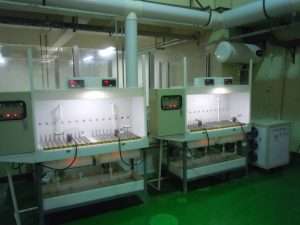Call us now:
Aqua regia is a highly corrosive mixture of concentrated nitric acid and hydrochloric acid, typically used in the process of refining gold and other precious metals. The name "aqua regia" is Latin for "royal water," reflecting the fact that it was once used by alchemists as a means of dissolving gold, a metal that was considered to be the "king" of metals.
In the process of refining gold using aqua regia, the gold is first melted and then dissolved in the acid mixture. The nitric acid oxidizes the gold and converts it into gold ions, while the hydrochloric acid provides chloride ions, which help to dissolve the gold ions and keep them in solution. The resulting solution is then heated to drive off any excess acid and water, leaving behind a residue of pure gold.
Aqua regia is a very powerful and dangerous acid, and should only be used by experienced professionals in a properly equipped and ventilated laboratory. The process of refining gold using aqua regia can also be expensive, time-consuming, and potentially hazardous, so it may not be practical for small-scale or amateur gold refining operations.
Furthermore, it is important to note that aqua regia is not selective in its ability to dissolve metals, meaning that it can also dissolve other metals that may be present in the material being refined. This can result in the loss of some of the precious metal being refined, as well as the risk of contamination from other metals.
To minimize these risks, it is essential to carefully control the concentrations and proportions of nitric acid and hydrochloric acid used in the aqua regia mixture, as well as the temperature and duration of the refining process. It is also important to properly dispose of any waste materials generated during the refining process, as they can be hazardous to human health and the environment.
In summary, aqua regia is a powerful tool for refining gold and other precious metals, but it should only be used by professionals with the proper training and equipment. Alternative methods of gold refining, such as electrolysis and solvent extraction, may be more appropriate for small-scale or amateur operations.


